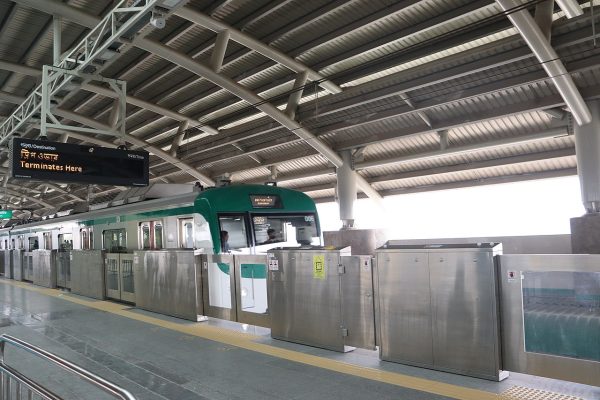Black_cats
ELITE MEMBER

- Joined
- Dec 31, 2010
- Messages
- 10,024
- Reaction score
- -5
Japan Deepens Defense Ties With Bangladesh
Japan recently announced that Bangladesh is among four countries that have been selected to receive Official Security Assistance.By Asif Muztaba Hassan
October 03, 2023

A train of the Japan-funded Mass Rapid Transport project enters the platform of Agargaon metro station, Dhaka, Bangladesh, on February 23, 2023.
Credit: Wikipedia/Wasiul Bahar
Japan’s Ambassador to Bangladesh Iwama Kiminori announced in August that Bangladesh was among four countries selected by the Japanese government to receive defense aidunder the Official Security Assistance (OSA), which is aimed at providing equipment, supplies and infrastructure development assistance to partner countries in the form of grants, rather than loans, to “reinforce” the region’s “comprehensive defense architecture.”
Aside from Bangladesh, Japan chose the Philippines, Fiji and Malaysia to receive OSA grants to improve the region’s defensive capabilities.
A common thread running through the countries that Japan chose for OSA defense cooperation is the context under which these countries operate — all are concerned about a rising and increasingly aggressive China. The Philippines, for instance, has been involved in skirmisheswith China’s People’s Liberation Army, its coast guard and maritime militia vessels near Ayungin Shoal or Second Thomas Shoal in the South China Sea, which Manila controls but China claims as its own. As for Fiji, like Japan, it is concerned about the growing Chinese influence in and around the Pacific Islands.
Bangladeshi Prime Minister Sheikh Hasina visited Japan in April when the two governments took their bilateral relationship to the next level; they upgraded their relationship from a “comprehensive” to a “strategic” relationship.
Japan has strong economic ties with most Asian countries, including Bangladesh. Bangladesh is the largest recipient of development and economic assistance from Japan, second only to India. Since 1972, it has received around $25 billion in Japanese development and economic assistance. Of this, $9.2 billion was received as Overseas Development Assistance (ODA), with priority given to private sector growth, particularly in the development of information and communication technology (ICT), tourism, transportation and agriculture.
Under the 40th ODA agreement that was signedfour years ago, $2.5 billion was directed toward five projects, including the development of the Dhaka Mass Rapid Transit (MRT) and the Matarbari deep seaport. Work on the Matarbari port is progressing fast and the port is expected to be fully operational by 2026. Other infrastructure and energy projects in southern Chattogram are also inching towards completion. Meanwhile, Dhaka’s MRT project, which is Tokyo’s most significant investment in Bangladesh, has transformed transportation in the capital. In only the first few months of partial operation, the MRT is already moving large swathes of people from busy city centers during rush hours and has eased traffic congestion. The outlook of full operations is promising.
Then there is trade. Bangladesh spends around $2 billion each fiscal year on imports from Japan and exports from Japan total $1.3 billion. Japan has emerged as a significant buyer of readymade garment (RMG) products. In the past ten years, Bangladesh’s RMG exports to Japan have almost quadrupled, with Dhaka earning $1.09 billion from Japan in the last fiscal year. The two countries are hoping to triple earnings from RMG this year.
Even as Bangladesh’s relations with Japan are growing, ties with the U.S. have entered a troubled phase over the last couple of years. Washington has been criticizing human rights violations in Bangladesh under the Awami League government. In 2021, it levied sanctions on several Bangladeshi security officials for employing extrajudicial tactics while on duty and barred them from entering the United States. The U.S. also denied visas to current and former Bangladeshi officials, members of pro-government and opposition parties, and members of law enforcement agencies, the judiciary and security services who are “suspected” of being complicit in rigging elections.
In April, U.S. Secretary of State Antony Blinken raised concerms over developments in Bangladesh, stressing the need for free and fair elections in the country.
Bangladeshi Prime Minister Sheikh Hasina hit back and accused the U.S. of seeking regime change in Bangladesh. “They are trying to eliminate democracy and introduce a government that will not have a democratic existence,” Hasina said in Parliament, drawing attention to the U.S.’ history of overthrowing governments. The U.S. “does not practice democratic norms beyond the Atlantic,” she said.
While the U.S. has stepped up its criticism of the Awami League government, it is likely that India, which is close to both Washington and Dhaka, will remain quiet amid this mudslinging. Meanwhile, China’s influence and investments in Bangladesh continue to grow.
It is against this backdrop that Japan’s inclusion of Bangladesh in the OSA must be seen. It makes “strategic sense” because it serves Tokyo’s geopolitical interest to balance China’s growing profile in Bangladesh.
Tokyo’s bid to transfer military surveillance equipment helps maintain regional stability. It stands testament to Quad’s commitment to ensuring security in the region, offsetting souring relations between the U.S. and Dhaka with enhanced Japanese defense cooperation, especially at a time when New Delhi chooses to be an ally of convenience with Dhaka.
It seems that Bangladesh’s recent deepening of relationship with Japan is an outcome of Dhaka’s careful balancing act of geopolitical affairs, at a time when major regional powers feel pressured to choose sides amid escalations. With New Delhi indifferent – or perhaps unwilling – Tokyo has stepped in to offset a temporary upsetting of ties between Washington and Dhaka to ensure that the latter stays within the U.S. fold.
AUTHORS
GUEST AUTHOR
Asif Muztaba Hassan
Asif Muztaba Hassan is a security researcher and an independent journalist. He writes on Bangladesh’s foreign policy with respect to bigger global actors, and the country’s domestic politics. Asif finished his Masters degree in Strategic Studies from S. Rajaratnam School of International Studies, NTU in Singapore.
Japan Deepens Defense Ties With Bangladesh
Japan recently announced that Bangladesh is among four countries that have been selected to receive Official Security Assistance.
thediplomat.com

